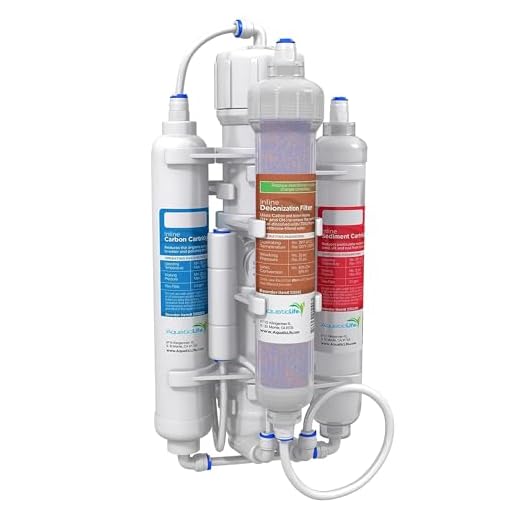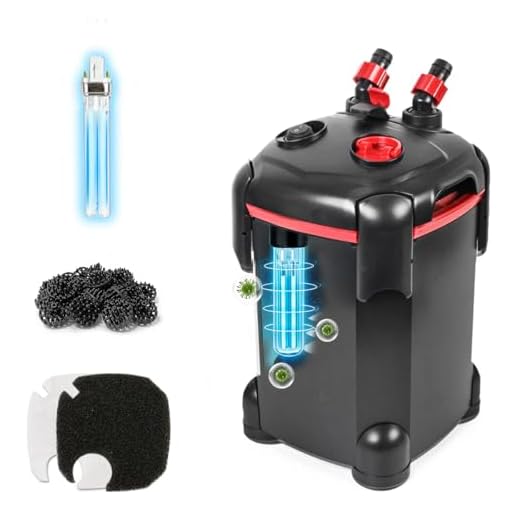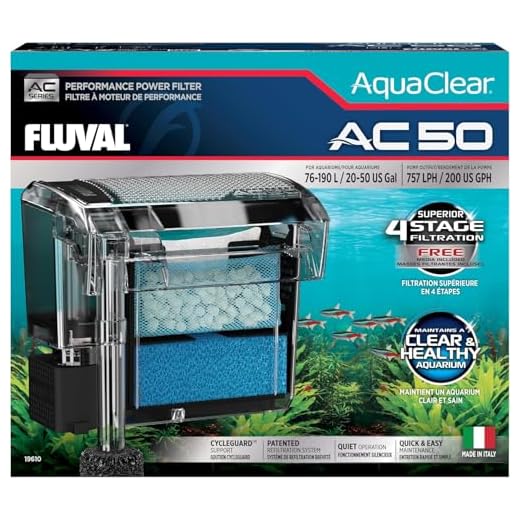Reef
Blog
Can i use filtered water for fish tank

Filtered water is often a better option for your fish tank compared to tap water. The quality of tap water varies depending on your location, and it may contain chlorine, chloramines, heavy metals, or other harmful substances. These impurities can be harmful to your fish and other aquatic organisms.
Filtered water, on the other hand, goes through a filtration process to remove impurities and contaminants. It helps maintain a healthier and safer environment for your fish. Different types of filters, such as carbon filters or reverse osmosis systems, can effectively remove chlorine, chloramines, sediment, and other unwanted chemicals from the water.
When using filtered water for your fish tank, it’s important to ensure that it’s properly filtered and free from any harmful substances. Regularly monitor the water quality and test for any unwanted levels of ammonia, nitrate, or pH imbalance. Even with filtered water, you may still need to treat it with necessary conditioners or supplements to create an optimal environment for your fish.
In conclusion, using filtered water can be a great choice for a fish tank, as it helps eliminate potential dangers from tap water. However, it’s essential to maintain the water quality and regularly monitor it to ensure the health and well-being of your aquatic pets.
Can I Use Filtered Water for My Fish Tank?
When setting up a fish tank, one of the most important factors to consider is the water quality. Fish are particularly sensitive to changes in water conditions, and using the right type of water is essential for their health and well-being. One question that commonly arises is whether filtered water can be used in a fish tank.
The answer is, it depends on the type of filter and the fish species being kept. Different filters remove different contaminants and substances from tap water. Some filters remove chlorine and other chemicals, while others also remove heavy metals and impurities.
If you are using a reliable water filter that removes chlorine and other harmful substances, then using filtered water for your fish tank can be a good option. This can help provide a safe and clean environment for your fish. However, it is important to note that even filtered water may still contain trace elements and minerals that might not be ideal for certain fish species.
- Before using filtered water in your fish tank, it is recommended to test the water’s pH, hardness, and other parameters to ensure they are within the appropriate range for your specific fish species.
- It is also a good idea to consult with a knowledgeable fish store or aquarium expert to get advice on the specific requirements of your fish and the type of water that is best suited for them.
Additionally, it is important to regularly monitor and maintain the quality of the water in your fish tank, regardless of whether you are using filtered water or tap water. Regular water changes, proper filtration, and the use of water conditioners can help ensure a healthy and thriving aquarium environment for your fish.
In summary, using filtered water in your fish tank can be a suitable option as long as the filter removes chlorine and other harmful substances. However, it is important to consider the specific requirements of your fish species and to regularly monitor and maintain water quality to ensure the well-being of your fish.
Benefits of Using Filtered Water for Your Fish Tank
Using filtered water for your fish tank can provide numerous benefits for your aquatic pets. Here are a few reasons why you should consider using filtered water:
1. Eliminates Harmful Substances: Filtered water removes harmful substances such as chlorine, chloramine, heavy metals, and toxins from tap water. These substances can be detrimental to the health of your fish and other aquatic organisms.
2. Improves Water Quality: By removing impurities, filtered water improves the overall quality of the water in your fish tank. This leads to a cleaner and healthier environment for your fish to thrive in.
3. Promotes Fish Health: Clean and pollutant-free water is essential for the well-being of your fish. Using filtered water helps maintain optimal water conditions, minimizing the risk of diseases and stress.
4. Reduces Algae Growth: Algae growth is a common issue in fish tanks. Filtered water reduces the nutrients that promote algae growth, helping to keep your tank clean and algae-free.
5. Enhances Fish Colors: Filtered water can enhance the vibrant colors of your fish. By reducing impurities and providing a cleaner environment, filtered water allows the true colors of your fish to shine through.
6. Prevents pH fluctuations: Tap water often has unstable pH levels, which can be harmful to fish. Filtered water helps stabilize the pH levels, providing a more consistent and suitable environment for your aquatic pets.
7. Reduces the Risk of Diseases: By removing contaminants, filtered water reduces the risk of introducing harmful bacteria, parasites, and viruses into your fish tank. This helps to create a healthier and safer habitat for your fish.
Overall, using filtered water in your fish tank has numerous benefits that contribute to the well-being and longevity of your aquatic pets. Consider investing in a reliable water filtration system to provide your fish with the clean and pollutant-free water they need to thrive.
Considerations When Using Filtered Water for Your Fish Tank
Using filtered water for your fish tank can have several benefits, but it is important to consider a few key factors before making the switch.
1. Water Parameters
One of the main considerations when using filtered water is the impact it can have on the water parameters in your fish tank. Different filters may remove or alter certain elements or chemicals in the water, which can affect the pH level, hardness, and overall stability of the water. It is essential to monitor these parameters regularly and make adjustments as needed to ensure a suitable environment for your fish.
2. Nutrient Availability
Filtered water may also have a lower nutrient content compared to untreated tap water. This can affect the growth and overall health of your fish and aquatic plants. If you use filtered water, it is crucial to supplement the tank with appropriate nutrients to support the biological processes and ensure the well-being of your underwater ecosystem.
Additionally, keep in mind that some filters, such as reverse osmosis systems, can remove beneficial minerals and trace elements along with contaminants. In such cases, it may be necessary to reintroduce these essential elements using additives or remineralizers.
3. The Importance of Water Changes
Regular water changes are a vital part of maintaining a healthy fish tank, regardless of whether you use filtered or tap water. They help remove accumulated waste, toxins, and excess nutrients, preventing potential problems such as ammonia build-up and algae outbreaks. It is essential to continue performing routine water changes, even when using filtered water.
Conclusion:
While using filtered water can offer advantages for your fish tank, it is crucial to be aware of the potential impacts on water parameters and nutrient availability. Monitoring your water quality and addressing any imbalances will help ensure a thriving aquatic environment for your fish and plants. Remember to continue performing regular water changes to keep your tank clean and healthy.
Choosing the Right Water Filter for Your Fish Tank
Aquarium water quality is crucial for maintaining a healthy and thriving fish tank. One of the most important aspects of water quality is filtration. Choosing the right water filter for your fish tank is essential to keep the water clean, clear, and safe for your fish.
Filtration Types
There are several types of water filters available for fish tanks, including mechanical, chemical, and biological filtration systems. Mechanical filters remove debris and particles from the water, chemical filters remove impurities and odors, and biological filters help to break down harmful substances through beneficial bacteria.
When selecting a water filter, it’s important to consider the size of your fish tank, the number of fish, and your desired maintenance level. Different filters have different flow rates and capabilities, so it’s crucial to choose one that can adequately handle the filtration needs of your specific aquarium.
Types of Water Filter Systems
There are various types of water filter systems to choose from, including hang-on-back filters, canister filters, and internal filters. Hang-on-back filters are easy to install and maintain, canister filters offer high-capacity filtration for larger tanks, and internal filters are suitable for small tanks or as additional filtration in larger setups.
Consider the space available around your fish tank, as some filters may require additional space behind or beside the tank. It’s also important to choose a filter that is quiet and energy-efficient, as it will be running continuously to maintain water quality.
Additionally, it’s recommended to choose a filter that allows for customization and the use of various filter media. This will allow you to tailor the filtration to meet the specific needs of your fish tank, ensuring optimal water quality and a healthy environment for your fish.
Regular cleaning and maintenance of the water filter is also essential to ensure its effectiveness. Follow the manufacturer’s instructions for cleaning and replacing filter media to keep the filter operating at its best.
In conclusion, choosing the right water filter for your fish tank is crucial for maintaining a clean and healthy environment for your fish. Consider the filtration needs of your aquarium, the available space, and the ease of maintenance when selecting a filter. With the right water filter system in place, you can enjoy a thriving and vibrant fish tank.
Q&A
Can I use filtered water for my fish tank?
Yes, using filtered water for your fish tank can be a good idea. Filtered water helps remove impurities and chemicals that can be harmful to fish. Just make sure that the filtration system you use is suitable for fish tank water and does not remove essential minerals that fish need.
Is using filtered water better than tap water for a fish tank?
Using filtered water can be better than tap water for a fish tank because tap water often contains chlorine, chloramines, heavy metals, and other chemicals that can harm fish. Filtering the water can help remove these harmful substances and provide a healthier environment for your fish.
What type of water filter should I use for my fish tank?
The type of water filter you should use for your fish tank depends on the size of your tank and the type of fish you have. There are different types of filters available, such as sponge filters, canister filters, and power filters. It’s important to choose a filter that provides adequate filtration and oxygenation for your fish.
Do I need to use a water conditioner with filtered water?
Even if you are using filtered water, it’s still recommended to use a water conditioner in your fish tank. Water conditioners help to neutralize any remaining chemicals or impurities in the water, making it safe for fish. They also help regulate the pH levels and remove harmful chlorine and chloramines.






